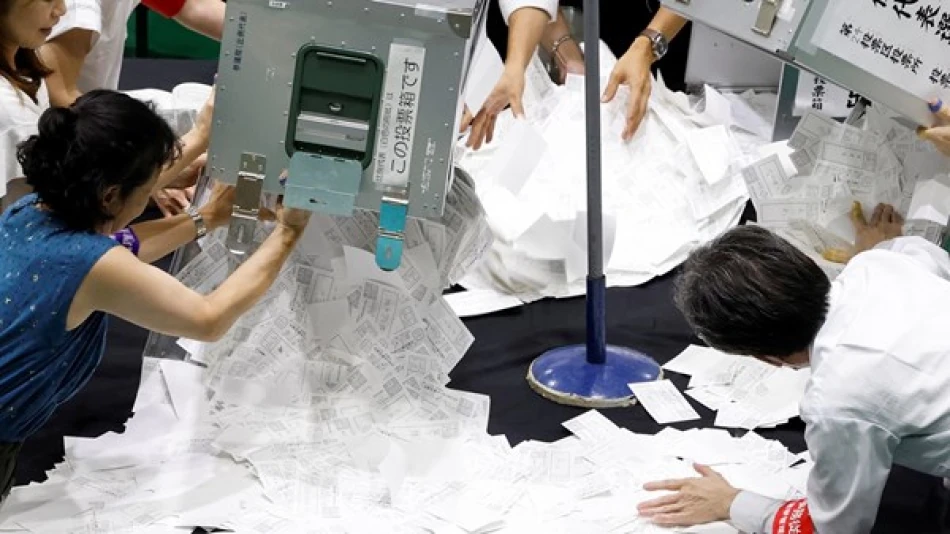
Japan TV: Government Loses Majority in Upper House Election
Japan's Ruling Coalition Loses Upper House Control as Political Crisis Deepens
Japan's ruling coalition has lost its majority in the House of Councillors following Sunday's elections, marking another devastating blow to Prime Minister Shigeru Ishiba's government and potentially accelerating the country's slide toward political instability. The defeat comes just months after the coalition's worst performance in 15 years during October's lower house elections, leaving Ishiba increasingly vulnerable to a no-confidence vote that could trigger his government's collapse.
Electoral Defeat Confirms Weakening Grip on Power
Japan's public broadcaster NHK confirmed that Ishiba's Liberal Democratic Party (LDP) and its coalition partner Komeito failed to secure the 50 seats needed to maintain control of the 248-seat upper chamber. With six seats still undecided at the time of reporting, the coalition's loss represents a significant erosion of political capital for a party that has dominated Japanese politics for decades.
Speaking to NHK after polls closed Sunday evening, a subdued Ishiba acknowledged the "harsh result," signaling his recognition of the coalition's diminished standing with voters.
Double Parliamentary Loss Creates Unprecedented Vulnerability
The upper house defeat compounds the coalition's October loss of its majority in the more powerful House of Representatives, creating an unprecedented situation where the ruling party lacks control of both chambers of Japan's parliament. This dual setback severely constrains Ishiba's ability to advance his legislative agenda and makes his government susceptible to opposition challenges.
Constitutional Crisis Looms
Under Japan's parliamentary system, losing control of both houses exposes Ishiba to potential no-confidence motions that could force his resignation or trigger snap elections. Such scenarios would thrust Japan into prolonged political uncertainty at a time when the nation faces mounting economic pressures and regional security challenges from China and North Korea.
Economic and Market Implications
Political instability in the world's fourth-largest economy typically unsettles financial markets and complicates policy implementation. Investors are likely monitoring whether Ishiba can maintain government functionality through coalition-building with opposition parties or whether Japan will face the disruption of another leadership transition.
The uncertainty could impact Japan's monetary policy trajectory, particularly as the Bank of Japan navigates its gradual shift away from ultra-loose monetary policies. Political gridlock might also delay crucial economic reforms and infrastructure investments that Japan needs to address its aging population and productivity challenges.
Historical Context: A Pattern of Political Turbulence
Japan experienced significant political instability between 2006 and 2012, cycling through six prime ministers in six years before the LDP's return to power under Shinzo Abe. The current crisis evokes memories of that tumultuous period, though Japan's economic fundamentals remain stronger today than during the earlier instability.
The LDP's recent struggles reflect broader voter dissatisfaction with corruption scandals, economic stagnation, and the party's handling of rising living costs. These grievances mirror anti-incumbent sentiment seen across many developed democracies in recent years.
Path Forward: Coalition Building or Collapse
Ishiba now faces the delicate task of governing without parliamentary majorities, likely requiring case-by-case negotiations with opposition parties to pass legislation. This approach could lead to policy compromises that dilute his reform agenda or create legislative deadlock that hampers government effectiveness.
Alternatively, continued political pressure could force Ishiba's resignation, potentially triggering another round of LDP leadership contests and general elections. Such developments would extend Japan's political uncertainty well into 2024, complicating the country's response to both domestic challenges and evolving international dynamics in the Asia-Pacific region.
Most Viewed News

 Layla Al Mansoori
Layla Al Mansoori






